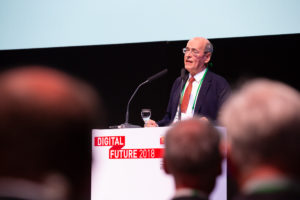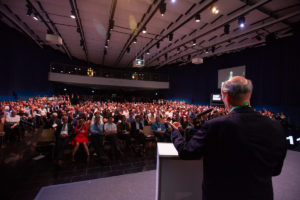New York and Brussels, 17 July 2018 – Access to digital connectivity and services is directly related to improvements in healthcare, education quality, fight to hunger and other major global challenges. This correlation has been proved, for the first time, in a comprehensive statistical analysis by Accenture Strategy for GeSI, published today in the pioneering report “Enabling the Global Goals”.
The report, presented at the 3rd SDG Business Forum in New York, also launched the Digital Access Index (DAI), a new holistic indicator to measure access to connectivity, technology, and digital solutions.
SDGs: a pioneering measure for the positive impact of digital
Accenture Strategy’s research for GeSI was able to demonstrate, through large datasets, that digital access has a strongly positive correlation with 11 out of 17 Sustainable Development Goals (SDGs). These include: no poverty, zero hunger, good health and well-being, quality education, gender equality, clean water and sanitation, affordable and clean energy, decent work and economic growth, innovation and infrastructure, sustainable communities, justice and strong institutions.
In this context, the report was able to go beyond simple statistical correlations and find early indications of causation. This is the case, for example, with reducing neonatal mortality. The analysis found that a 5% increase in digital access has the potential to save 2 babies for every 1000 births, which equals to a 7.4% reduction in mortality. This is mainly thanks to better health information and remote diagnostics.
DAI: an index to help organisations improve
In order to make analysis and follow-up possible, GeSI and Accenture have developed the Digital Access Index. The index is a new, unique tool to measure all the main aspects of digital: connectivity (including infrastructure, use, and affordability), technologies, and digital solutions.
Thanks to the Index, the ICT industry will be able to target progress areas and check against results. The report identified three main action areas for the industry: scaling positive impacts, flipping the negative impacts, and innovating for all the 17 SDGs.
“This report shares new, compelling evidence that the digital sector is positively linked to achieving the SDGs” said Luis Neves, GeSI’s Managing Director. “GeSI has been working to raise awareness of the enabling potential of digital technologies for over a decade. With this report, we reiterate our commitment to steering the impact of digital solutions on the SDGs, and we look forward to engaging with partners to support the achievement of the Goals by 2030”.
The report can be accessed here: www.digitalaccessindex-sdg.gesi.org
About GeSI
The Global Enabling Sustainability Initiative (GeSI) is a strategic partnership of the Information and Communication Technology (ICT) sector committed to creating and promoting digital technologies and practices that foster economic, environmental and social sustainability. Formed in 2001, GeSI’s vision is a sustainable world through responsible, ICT-enabled transformation. GeSI fosters global and open cooperation, informs the public of its members’ voluntary actions to improve their sustainability performance, and promotes technologies that foster sustainable development. GeSI enjoys a diverse and global membership, representing around 30 of the world’s leading ICT companies and partners with over 30 global business and international organizations such as the International Telecommunications Union (ITU), the United Nations Framework Convention on Climate Change (UNFCCC), the United Nations Environment Program (UNEP), the World Business Council for Sustainable Development (WBCSD), the World Resources Forum Association (WRFA), the Institute of Electrical and Electronics Engineers (IEEE), the Responsible Business Alliance (RBA), the Centre for Sustainable Consumption and Production (CSCP), The Institute for Sustainable Development and International Relations (IDDRI), the Global Climate Forum (GCF), the World Green Building Council (WGBC), the Flemish Institute for Technological Research (VITO), and the International Energy Agency (IEA) – as well as a range of international stakeholders committed to ICT sustainability objectives to share and develop ideas, launch joint initiatives, and collaborate on a broad range of sustainability projects. These partnerships help shape GeSI’s global vision regarding the evolution of the ICT sector, and how it can best meet the challenges of sustainable development.
For more information, see www.gesi.org.
Media inquiries: Luis Neves, Managing Director – luis.neves@gesi.org




